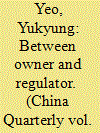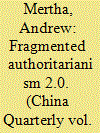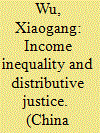| Srl | Item |
| 1 |
ID:
093237


|
|
|
|
|
| Publication |
2009.
|
| Summary/Abstract |
This study explains the institutional structure and mechanism of economic regulation in China's telecommunications basic service industry. The case of telecoms basic service provides an excellent window to explore how Chinese leadership governs strategic state sectors whose assets and profits are central to the national economy. Challenging the ideational model of independent regulator, this study argues that the State-owned Assets Supervision and Administration Commission (SASAC) explains much of the telecoms business regulation, as the authority of the Ministry of Information Industry has been circumscribed by other party-state institutions. The SASAC's regulatory power suggests that the primary goal of the Chinese industrial economy is the best protection of state assets through the creation of large and strong state firms, not the protection of consumers' interests by breaking up the monopoly in markets.
|
|
|
|
|
|
|
|
|
|
|
|
|
|
|
|
| 2 |
ID:
093235


|
|
|
|
|
| Publication |
2009.
|
| Summary/Abstract |
Traditional analyses of political liberalization in China focus on elections or other facets of democratization. But they cannot account for the fact that although China remains authoritarian, it is nevertheless responsive to the increasingly diverse demands of Chinese society. I argue that the rules of the policy-making process are still captured by the fragmented authoritarianism framework, but that the process has become increasingly pluralized: barriers to entry have been lowered, at least for certain actors (hitherto peripheral officials, non-governmental organizations and the media) identified here as "policy entrepreneurs." With policy change as the variable of interest, I compare three cases of hydropower policy outcomes. I argue that policy entrepreneurs' ability to frame the issue effectively explains variation in hydropower policy outcomes. I then extend these findings to an unlikely policy area, international trade, specifically, the 2001-06 Sino-EU trade talks over child-resistant lighter safety regulations.
|
|
|
|
|
|
|
|
|
|
|
|
|
|
|
|
| 3 |
ID:
093239


|
|
|
|
|
| Publication |
2009.
|
| Summary/Abstract |
Over the past decades income inequality has been sharply increasing in both mainland China and Hong Kong, two Chinese societies that have distinct paths of institutional development. While previous studies on income inequality have attempted to document the trend and investigate its causes, this article focuses on people's perceptions of legitimate income inequality and how these perceptions are related to their attitude towards inequality. Analyses of data collected in separate population surveys in China (2005) and Hong Kong (2007) reveal a higher degree of tolerance of income inequality and a higher degree of perceived fairness of income distribution in Hong Kong than in the mainland. In both societies, such normative support for income inequality is positively associated with people's perceptions of opportunities.
|
|
|
|
|
|
|
|
|
|
|
|
|
|
|
|
| 4 |
ID:
093242


|
|
|
|
|
| Publication |
2009.
|
| Summary/Abstract |
This study investigates the complicated interplay between indigenous and mainstream discourse in the production of Taiwanese indigeneity. Via the case study of Syaman Rapongan ?????, an indigenous writer in Taiwan known for his ethnographic portrayal of his tribal culture, I examine how the production of indigeneity in Taiwan involves not only inscription of resistance from indigenous people but also strategic exploitations of transnational legacies by different social groups as they struggle over the definition of indigeneity to formulate their own specific agendas. It is the contention of this article that the question of Taiwanese indigeneity is not just about indigenous self-representation, that is, claiming the subject position of the indigenous people and seeking to restore declining, oppressed indigenous cultural heritages. The study shows that we need to go beyond the familiar scheme of binary opposition to deal with the complexity of the question of indigeneity. The article ends with a re-theorization of the relationship between indigenous and new Taiwanese identity discourse in terms of Jacques Derrida's notion of "inheritance.
|
|
|
|
|
|
|
|
|
|
|
|
|
|
|
|
| 5 |
ID:
093240


|
|
|
|
|
| Publication |
2009.
|
| Summary/Abstract |
Using newly available documents from the PRC Foreign Ministry Archive, this article traces the evolving legacies of the War of Resistance in the first seven years of the People's Republic. Analysis is offered of PRC campaigns against Japanese bacteriological war crimes, criticisms of American dealings with Japanese war criminals, and the 1956 trial of Japanese at Shenyang. Throughout, behind-the-scenes tensions with the Soviet Union and internal bureaucratic struggles over the Japanese legacy regarding these matters are revealed. The article thereby aims to shed light on how the War of Resistance affected post-war China's foreign relations, demonstrating how the young Republic advantageously used wartime legacies as diplomatic tools in relations with the superpowers and within the orchestrated clangour of domestic propaganda campaigns.
|
|
|
|
|
|
|
|
|
|
|
|
|
|
|
|